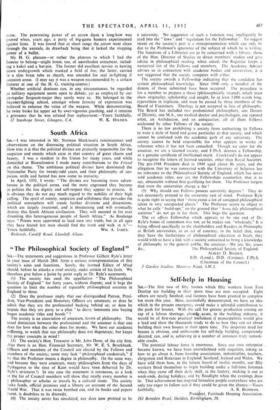The Philosophical Society of England' , Sia,—The statements and suggestions in
Professor Gilbert Ryle's letter in your issue of March 28th form a serious misrepresentation of this society's aims and functions. Surely, the learned Editor of Mind should, before he attacks a rival society, make certain of his facts. We therefore give below a 'Point by point reply to Dr. Ryle's statements.
(1) The society has used the appellation "The Philosophical Society of England" for forty years, without dispute; and it begs the question to limit the number of reputable philosophical societies in England to three.
(2) Does the professor imply that our distinguished Patron, Presi- dent, Vice-Presidents and Honorary Officers are amateurs; or does he admit that they are the professional backing behind us; or does he impute that they are party to a plan "to decoy -innocents into buying bogus academic titles and hoods " ?
The society is an association of amateurs, lovers of philosophy. The usual distinction between the professional and the amateur is that one does for love what the other does for money. We have our acadamic stiffening, to watch that our philosophy does not degenerate, but keeps the proper concepts in mind !
(3) The society's Hon. Treasurer is Mr. John Dove, of the city firm. Also- there is an Hon. Financial Secretary, Mr. W. E. S. Brockbank. Officers and members of the Council are elected by the Fellows and members, of the society; some may lack "philosophical credentials," if by that the Professor means a degree in philosophy. (In the same way, and because they were amateurs, many philosophers from the days of Pythagorus to the time of Kant would have been debarred by Dr. Ryle's strictures !) In any case the statement is erroneous, as a look at the list of Council members will show that nearly every member is a philosopher or scholar or travels by a cultural route. The society Jacks funds, official premises and a library on account of the Second World. War. That it was twice bombed out, and its books and papers burnt, is doubtless to its discredit.
.(4) The .society never has simulated, nor does now pretend to be
a university. No suggestion of such a function may intelligently be read into the " laws " and regulation for the Fellowship." To suggest intent on the society's part is a misrepresentation which can only be due to the Professor's ignorance of the subject of which he is writing. The functions of a Librarian are to be concerned with a library; those of the Hon. Director of Studies to direct members' studies and give advice in philosophical reading, when asked; the Registrar keeps a numerical list of the Fellows and members. The Academic Adviser advises us in connection with academic bodies and universities; it is not suggested that the society competes with either.
The society awards a Fellowship indicating that the candidate has certain philosophical knowledge. Since 1948 only a handful of the dozens of those submitted have been accepted. The procedure is for a member to prepare a thesis (philosophically treated), which must show originality, scholarship and insight, be at least 5,000 words long, typewritten in triplicate, and must be passed by three members of the Board of Examiners. Theology is not accepted in lieu of philosophy. The Board has included two professional philosophers, one Doctor of Divinity, one M.A., one medical doctor and psychologist, one reputed artist, an Archdeacon, and an antiquarian; all of them Fellows acclaimed by other Fellows of the society.
There is no law prohibiting a society from authorising its Fellows to wear a style of hood and gown particular to that society, and which cannot be confused with the academic garb of any university. The society cannot be held responsible for what appears in works of reference when it has not been consulted. Though we cater for the amateur, we are a learned society, and F.Ph.S. denotes a Fellowship, or a genuine certificate of intellectual merit. Crockford's do not appear to recognise the letters of learned societies, other than Royal Societies. The pre-1948 President died in 1949 aged about 86 years, and the allegation that he was connected with the University of Sulgrave has no relevance to the Philosophical Society of England, which has never sold academic titles; nor are the Fellowships counterfeit, that is to say, obtainable without first qualifying for them. The Professor forgets that. even the universities charge a fee !
(5) Why should our Fellows possess university degrees ? They do not necessarily pretend to the university cast of mind. Professor Ryle is quite right in saying that "there exists a lot of untapped philosophical talent in very unexpected places." The Professor seems to object to what he calls "build-ups," on the ground that "bona fide philosophical societies" do not go in for them. This begs the question.
The ex officio Fellowship which appears to be one end of Dr. Ryle's bones. of contention was not, as he makes out, "wholesale." It is being offered specifically to the chairholders and Readers in Philosophy at British universities, as an act of courtesy, in the belief that, since they have the furtherance of philosophical education at heart, they would wish to have a link with a society concerned to bring a knowledge of philosophy to the general public, the amateur.—We are, Sir, yours
$cc., The Philosophical Society of England.
ALBERT D. BELDEN,
S.D. (Lond.), D.D. (Ursinus), F.Ph.S. (Chairman of the Council.)
3 Garden Studios, Manresa Road, S.W.3.


































 Previous page
Previous page